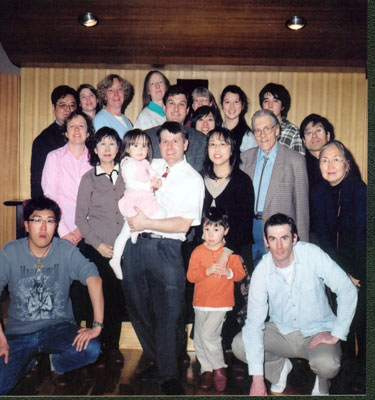A letter from Tom Goetz serving in Japan
November 2016
Every time we celebrate Christmas and sing old and familiar hymns, how often do we pause to think about what we are actually singing? On December 18, 2015, in the Hokusei University Chapel, longtime teacher Sally Nakai Kobayashi shared her views about why we celebrate Christmas. Sally, a U.S. citizen born into a Japanese American family while the family was being interned in Manzanar, one of the 10 concentration camps operated by the United States by way of Executive Order 9066, has been in Japan most of her adult life. She is a noted author of the book Creating the Sapporo Snow Festival, BOOKS 43 NORTH (2004). This interview is based upon her talk and subsequent conversations.
Sally: Why do we celebrate Christmas?
Tom: I have no idea. It’s fun?
Sally: This Bible verse tells us. Luke 2:10-11 (Good News Bible): “… but the angel said to them, ‘Don’t be afraid! I am here with good news for you, which will bring great joy to all the people. This very day in David’s town your Savior was born—Christ the Lord!’”
Tom: We celebrate the birth of Jesus.
Sally: Do you know the Christmas song, “The Twelve Days of Christmas”?
Tom: Yes, of course. We sang it while Mom played it on the piano. It was everyone’s favorite.
Sally: Many people think it’s a fun song about strange Christmas gifts.
Tom: What do the 12 days stand for?
Sally: The “Twelve Days of Christmas” are the days between Christmas Day and Epiphany, January 6. That is the day that the three Wise Men (Magi) brought gifts to the baby, Jesus. But the song had a very serious purpose when it was written.
Tom: When was that?
Sally: Catholics in England during the period 1558 to 1829 were prohibited from practicing their faith. Even today there is religious persecution in some places. It is said that the song “The Twelve Days of Christmas” was written in England as a secret way to help children learn about the Christian faith.
Tom: But what about all the strange gifts?
Sally: The gifts in the song have hidden meanings about faith. The “true love” in the song is not an earthly suitor. “True love” refers to God. The “me” who receives the presents refers to every baptized person. The “partridge in a pear tree” is Jesus Christ, the Son of God.
Tom: The song is long but easy to learn because it repeats the lines.
Sally: Yes. Now pick up your guitar and let’s sing:
On the first day of Christmas, my true love sent to me,
a partridge in a pear tree.
On the second day of Christmas, my true love sent to me,
two turtle doves and a partridge in a pear tree…
Tom: A partridge in a pear tree is Jesus Christ, and two turtle doves refers to…
Sally: The Old and New Testaments of the Bible.
Tom: I see. What about three French hens?
Sally: They refer to faith, hope and charity, the three theological virtues found in I Corinthians 13:13.
Tom: Let me guess: four calling birds refers to the four Gospels, Matthew, Mark, Luke, and John. But what about the five golden rings?
Sally: They refer to the first five books of the Old Testament, the Pentateuch, written and compiled by Moses. The first book, Genesis: The title “Genesis” means “origin” and appropriately describes its contents. It tells how God created the universe. And it gives a history about humanity’s sin and suffering and humanity’s fall from grace.
Book two, Exodus: Exodus is a Latin word from the Greek, exodus. It means “exit,” “departure,” which refers to the most important event in Israel’s history, the departure from Egypt where the Hebrews were slaves for many years. The most famous part of Exodus is the list of the Ten Commandments in Chapter 20.
Book three, Leviticus, contains regulations for worship and religious ceremonies in ancient Israel. The main theme is the holiness of God and the ways in which God’s people were to worship and live so as to maintain their relationship with “the holy God of Israel.”
Book four, Numbers, tells the story of the Israelites during the nearly 40 years that passed after they left Egypt and entered the Promised Land. The people were often discouraged and afraid when things were difficult, and they rebelled against God and Moses. It is the story of God’s faithful, persistent care for God’s people in spite of their weakness and disobedience. And it tells about Moses’ steadfast, sometimes impatient, devotion to God and to his people. The name “Numbers” comes from the census Moses took of the Israelites at Mount Sinai before their departure and again in Moab, east of the Jordan, about a generation later.
Book five, Deuteronomy: Moses gives a series of speeches to the people remembering the great events of the 40 years of their wanderings. Joshua is appointed the next leader and Moses dies in Moab. The great theme of the book is that God has saved and blessed the chosen people, whom God loves. The people are reminded to remember this and love and obey God so that they may have life and continued blessings. The key verses of this book are Chapter 6:4-6, which Jesus called the greatest of all commandments, “Love the Lord your God with all your heart, with all your soul, and with all your strength.”
Tom: I will need some help with the six geese a-laying.
Sally: This refers to the six days of creation (Genesis Chapter 1) in the beginning when God created the universe.
Day 1: God said, “Let there be light,” and light appeared and God separated the light into day and night.
Day 2: God separated the waters and created the sky.
Day 3: God created the Earth and all the plants.
Day 4: God made the sun, moon and stars to shine.
Day 5: God created all the creatures that live in the sea.
Day 6: God filled the Earth with animals, birds of the air and people.
Tom: And we know that on day seven the whole universe was completed and God rested. God blessed the seventh day as a day of rest.
Sally: What do you think seven swans a-swimming refers to?
Tom: I have no idea.
Sally: The seven swans a-swimming refers to the seven gifts of the Holy Spirit.
“We have gifts that differ according to the grace given to us; prophecy, in proportion to faith; ministry, in ministering; the teacher, in teaching; the exhorter, in exhortation; the giver, in generosity; the leader, in diligence; the compassionate, in cheerfulness” (Romans 12:6-8 NRSV).
Tom: And the eight maids a-milking?
Sally: They refer to the eight beatitudes, which by definition are states of perfect blessedness or happiness.
1. Blessed are the poor in spirit, for theirs is the kingdom of heaven.
2. Blessed are those who mourn, for they will be comforted.
3. Blessed are the meek, for they will inherit the earth.
4. Blessed are those who hunger and thirst for righteousness, for they will be filled.
5. Blessed are the merciful, for they will be shown mercy.
6. Blessed are the pure in heart, for they will see God.
7. Blessed are the peacemakers, for they will be called sons of God.
8. Blessed are those who are persecuted because of righteousness, for theirs is the kingdom of heaven.
Tom: If you don’t mind, why don’t you finish up. I might guess that the number 10 stands for the Ten Commandments.
Sally: You are right on that one. I’ll wrap it up. The nine ladies dancing refers to the nine fruits of the Holy Spirit (Galatians 5:22-23). But the fruit of the Spirit is: 1. love, 2. joy, 3. peace, 4. patience, 5. kindness, 6. goodness, 7. faithfulness, 8. gentleness, and 9. self-control.
And the 10 lords a-leaping refers to the Ten Commandments (Exodus 20:1-17).
1. You shall have no other gods before me.
2. You shall not make for yourself any idols.
3. You shall not take the name of the Lord thy God in vain.
4. Remember the Sabbath day by keeping it holy.
5. Honor your father and your mother.
6. You shall not murder.
7. You shall not commit adultery.
8. You shall not steal.
9. You shall not give false testimony against your neighbor.
10. You shall not covet (want something that belongs to someone else).
The 11 pipers piping refers to the 11 faithful apostles. Originally Jesus had 12 apostles, but one betrayed him. The faithful apostles were: 1. Simon Peter, 2. Andrew, 3. John, 4. James the Greater, 5. James the Less, 6. Matthew, 7. Philip, 8. Bartholomew, 9. Thomas, 10. Thaddaeus, and 11. Simon the Zealot.
And finally the 12 drummers drumming refers to 12 points of doctrine in the Apostle’s Creed. A creed is a brief statement of religious belief. In some churches the people recite this creed during the Sunday service. The important word is “believe.”
1. I believe in God the Father Almighty, Maker of heaven and earth.
2. And in Jesus Christ, His only begotten Son, our Lord,
3. Who was conceived by the Holy Ghost, born of the Virgin Mary,
4. Suffered under Pontius Pilate, was crucified, dead and buried.
5. The third day he rose again from the dead,
6. He ascended into heaven, and sits at the right hand of God the Father Almighty,
7. From thence he shall come to judge the quick and the dead.
8. I believe in the Holy Ghost.
9. I believe in the holy catholic church, the communion of saints,
10. The forgiveness of sins,
11. The resurrection of the body,
12. And the life everlasting. Amen.
Tom: With the outwardly and sometimes whimsical depictions of a seemingly out–of-control Christmas, we have a blueprint of the Christian faith that came from our Catholic sisters and brothers when their faith ancestors were oppressed. Interestingly enough, the song itself is so inclusive, any Christian can sing and benefit from it. It focuses on the Trinity, sets us toward being biblically literate, and helps us to find our place within the ecumenical world as laid down by the Apostles Creed. It strikes me as a way for the Catholics at that time to teach their young a formula for getting along with their Protestant playmates. And from playmates to friends.
Sally: And from friends to neighbors, co-workers, husbands and wives too.
Tom: Imagine all the people, living life in peace. You know who said that?
Sally: John Lennon, but I am not sure he had the “Twelve Days of Christmas” in mind!
Tom: Probably not. I guess we shall never know for sure. Thank you so much for your message.
Sally: You are welcome.
To all our readers, thank you for taking the time to visit us here in Japan. It is gifts from faith friends such as yourselves that make our presence here possible. Through your prayers, fellowship sharing, hospitality when we visit for mission interpretation we are constantly reminded of our togetherness in faith and vision. Please forward this to your friends and share the good news of what God is doing in our world.
Ubi caritas, et amor, Deus ibi est.
Where there is caring and love, God is always there.
Thomas
![]() You may freely reuse and distribute this article in its entirety for non-commercial purposes in any medium. Please include author attribution, photography credits, and a link to the original article. This work is licensed under a Creative Commons Attribution-NonCommercial-NoDeratives 4.0 International License.
You may freely reuse and distribute this article in its entirety for non-commercial purposes in any medium. Please include author attribution, photography credits, and a link to the original article. This work is licensed under a Creative Commons Attribution-NonCommercial-NoDeratives 4.0 International License.

